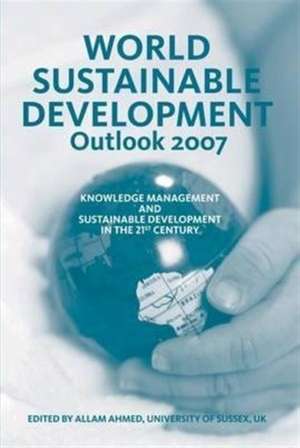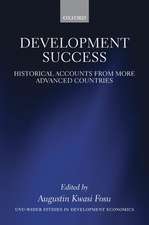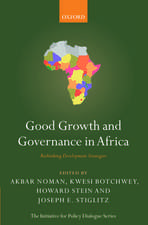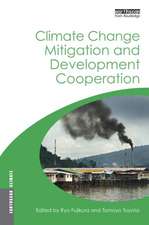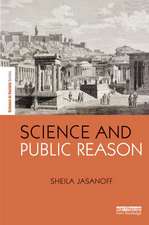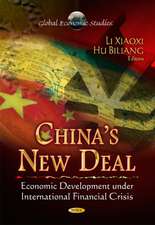World Sustainable Development Outlook 2007: Knowledge Management and Sustainable Development in the 21st Century: World Sustainable Development Outlook
Editat de Allam Ahmeden Limba Engleză Hardback – oct 2007
This is a truly global source book, which is reflected in the varied national and cultural origins of the contributors, as well as the topics and case studies covered. Each year a different theme will be covered. The theme of World Sustainable Development Outlook 2007 is the different dimensions of knowledge and technology management in the new era of information revolution and how they relate to sustainable development.
Rapid innovation in information and communication technologies (ICTs) is clearly reshaping the world we live in. Countries are increasingly judged by whether they are information-rich or information-poor. It is estimated that 30–40% of the world's economic growth and 40–50% of all new jobs will be IT-driven. Education and knowledge are the chief currencies of the modern age, and can also be a strategic resource and a lifeline for sustainable development. Yet, in Africa, millions of people have never made a telephone call.
The technological gulf between developed and developing countries (DCs) is likely to widen further with the rapid expansion of the internet and the speedy transition to digitalisation in the West. The impacts on DCs may include an increase in the so-called brain drain and growing dependence on foreign aid of a different kind – knowledge aid. There are fears that knowledge imperialism is already with us.
What is clear is that most of the technological innovations in ICTs are Western-designed and fail to address the needs of the most disadvantaged. The interest of industrialised countries in the use of ICTs in DCs has largely been more concerned with the profitability of their own business enterprises than with any broader goals concerning the development of the host countries. DCs face the challenge of either becoming an integral part of the knowledge-based global economy or the very real danger of finding themselves on the wrong side of the digital divide. Successful management in the new millennium requires developing new methods and approaches to meet the challenges and opportunities of this information revolution while at the same time fostering sustainable development. Adopting a holistic approach, this book aims to critically examine the interrelationship between these different issues in order to reach solutions and a consensus for a better future, taking into account a variety of international, institutional and intellectual perspectives. It uses case and country studies in technological innovation and experience so that lessons in effective management of ICTs can be learned from successful initiatives, ideas and innovations.
Preț: 851.82 lei
Preț vechi: 1142.84 lei
-25% Nou
Puncte Express: 1278
Preț estimativ în valută:
162.100€ • 168.16$ • 136.02£
162.100€ • 168.16$ • 136.02£
Carte tipărită la comandă
Livrare economică 26 martie-09 aprilie
Preluare comenzi: 021 569.72.76
Specificații
ISBN-13: 9781906093020
ISBN-10: 1906093024
Pagini: 400
Dimensiuni: 156 x 234 x 25 mm
Greutate: 0.68 kg
Ediția:New.
Editura: Taylor & Francis
Colecția Routledge
Seria World Sustainable Development Outlook
Locul publicării:Oxford, United Kingdom
ISBN-10: 1906093024
Pagini: 400
Dimensiuni: 156 x 234 x 25 mm
Greutate: 0.68 kg
Ediția:New.
Editura: Taylor & Francis
Colecția Routledge
Seria World Sustainable Development Outlook
Locul publicării:Oxford, United Kingdom
Public țintă
PostgraduateCuprins
Preface
Allam Ahmed, University of Sussex, UK
Part I: Introduction
Managing knowledge in the 21st century and the roadmap to sustainability
Allam Ahmed, University of Sussex, UK
Part II: Education
Do education reforms result in quality education?
Siham El-Kafafi, Manukau Institute of Technology, New Zealand
Educational outcomes and labour market based on supply and demand: A Qatari perspective
Hend A. Jolo, Qatar University
In search of African Tigers: Repositioning African universities for challenges of research and development, wealth creation and sustainable development
Michael J. Emeji, Rivers State University of Science and Technology, Nigeria
Research supervision: Training, process and experience
Ihab Tewfik, University of Westminster, UK, and Sundus Tewfik, London Metropolitan University, UK
Part III: Knowledge Management
Indigenous knowledge in agriculture with particular reference to medicinal crop production in Khorasan, Iran
P. Rezvani Moghaddam, Ferdowsi University of Mashhad, Iran, A.K.S. Huda and Q. Parvez, University of Western Sydney, and A. Koocheki, Ferdowsi University of Mashad, Iran.
Strategic vision to knowledge management strategy: An evaluative paradigm
T. Shareef Younis, Mosul University-Iraq
Managing knowledge workers: The technologist in the IT industry
S.C. Poornima, ICFAI-IBS, India
Part IV: Information and Communications Technologies
Cybernating academe: centralisation of science assessment as hegemony – an African alternative
Williams E. Nwagwu, University of Ibadan, Nigeria
Readiness for online learning in business schools in India
Ramesh Behl, Deepak Chawla and Himanshu Joshi, International Management Institute, India
Improving agricultural sustainability and profitability via the use of computerised decision-support systems is challenging and complex
J.B. Robinson and D.M. Freebairn, Natural Resources and Water, Australia, and A.K.S. Huda, University of Western Sydney, Australia
A longitudinal study of farmers and trainers capturing climate information for sustainable development
D.A. George, University of Queensland, Australia, J.F. Clewett, Agroclim Australia, A.K.S. Huda, University of Western Sydney, Australia, C.J. Birch, A.H. Wright, University of Queensland, Australia, W.R. Allen, AgForce Queensland, and Q. Parvez, University of Western Sydney, Australia
Exploring best practices in Public Private Partnership (PPP) in e-government through select case studies from India
Soumitra Sharma, Banaras Hindu University, India
Airline distribution systems: History, challenges and solutions
Michael J. Williams and Dawna L. Rhoades, Embry-Riddle Aeronautical University, USA
Management of stock exchanges: Automation and demutualisation
Subba Reddy Yarram, University of New England, Australia
XBRL benefits, challenges and adoption in the US and UK: Clarification of a future research agenda
Aminah Abdullah, Belfast Metropolitan College, UK, Iqbal Khadaroo, Queen's University Belfast, UK, and Junaid Shaikh, Curtin University, Malaysia
Assuring intermodal security using RFID tags on cargo containers
Michael Williams and Cheryl Cunningham, Embry-Riddle Aeronautical University, USA
Part V: Science Technology and Innovation
Genetic engineering perception in New Zealand: Is it the way of the future?
Siham El-Kafafi, Manukau Institute of Technology, New Zealand
Effect of sheath rot (Sarocladium oryzae) on rice seed health
S. Akter, M.A.T. Mia, M.S. Kabir and M.A. Latif, Bangladesh Rice Research Institute
Technical efficiency in artisanal fisheries: Evidence from Fiji
Mahendra Reddy, University of the South Pacific, Fiji
Extension workers' attitudes towards usefulness of an integrated soil fertility and nutrient management approach for sustainable crop production: A study in Bangladesh
M.G. Farouque and H. Takeya, Nagoya University, Japan
Livelihoods of the people involved in pangasiid catfish (Pangasius hypophthalmus) farming in Mymensingh, Bangladesh
Shuraya Tasnoova, Khan M. Iqbal and Izumi Iwamoto, Kagoshima University, Japan, and Md. Mahfuzul Haque, Bangladesh Agricultural University
Turkey's high-tech profile and sustainable development
Feride Doganer Gonel, Yildiz Technical University, Turkey
The contextual dimension of risk dialogues: The case of water recycling weblogs in South East Queensland, Australia
Jennifer Summerville, Evonne Miller, Lorraine Bell and Laurie Buys, Queensland University of Technology, Australia
Part VI: Climate Change and Energy
Investment trends in alternate energy methods by large US corporations
M. Anaam Hashmi, Minnesota State University, USA
Aviation in a carbon constrained world
Dawna L. Rhoades, Embry-Riddle Aeronautical University, USA
Part VII: Macro-economic Analysis
Neoliberal idealism, state building, and the Washington Consensus: A story (still) under development
Michael Heazle, Griffith Asia Institute, Australia
Post-crisis economic performance in East Asia: Recovery or sustained decline?
Moazzem Hossain, Griffith University, Australia
A structural approach to diversification of the nation's economy and economic development of Kazakhstan
Yelena N. Zabortseva, Kazak-British Technical University, Kazakhstan
The impact of industrial policy on capital structure with financial flexibility, macroeconomic conditions and economic growth and development taken into account: Evidence from Taiwan
Hsien-Hung Yeh, National Pingtung University of Science and Technology, Taiwan/Griffith University, Australia, and Eduardo Roca, Griffith University, Australia
The firm and industry structure in economically sustainable development: A case study of the telecommunication industry
Frank M. Little, Griffith University, Australia
Part VIII: Trade and Development
Trade and economic growth in Asian-5
Tajul Ariffin Masron, Universiti Sains Malaysia, and Zulkornain Yusop, Ahmad Zubaidi Baharumshah and Muzafar Shah Habibullah, Universiti Putra Malaysia
Towards an agri-food "culture": Managing the impact on agricultural supply chains of changes in consumer culture
Tony Webb, University of Western Sydney, Australia
International transmission of stock price movement: Evidence from ASEAN plus 3 and the world's most advanced markets
Ruzita Abdul Rahim and Abu Hassan Shaari Mohd. Nor, National University of Malaysia
Part IX: Gender and Development
Women, sustainable community development and human resource development: The Sub-Saharan African context
Peter Cunningham and Kristine Sydhagen, Nelson Mandela Metropolitan University, South Africa
Role of women in farm decision-making using data from selected locations in Bangladesh
S. Hassan, Ministry of Agriculture, Government of Bangladesh, and Q. Parvez, A.K.S. Huda and G. Ramsa, University of Western Sydney, Australia
The economics behind son preference in South India
S. Mumtaj Begum and Christianna Singh, Lady Doak College, India
Allam Ahmed, University of Sussex, UK
Part I: Introduction
Managing knowledge in the 21st century and the roadmap to sustainability
Allam Ahmed, University of Sussex, UK
Part II: Education
Do education reforms result in quality education?
Siham El-Kafafi, Manukau Institute of Technology, New Zealand
Educational outcomes and labour market based on supply and demand: A Qatari perspective
Hend A. Jolo, Qatar University
In search of African Tigers: Repositioning African universities for challenges of research and development, wealth creation and sustainable development
Michael J. Emeji, Rivers State University of Science and Technology, Nigeria
Research supervision: Training, process and experience
Ihab Tewfik, University of Westminster, UK, and Sundus Tewfik, London Metropolitan University, UK
Part III: Knowledge Management
Indigenous knowledge in agriculture with particular reference to medicinal crop production in Khorasan, Iran
P. Rezvani Moghaddam, Ferdowsi University of Mashhad, Iran, A.K.S. Huda and Q. Parvez, University of Western Sydney, and A. Koocheki, Ferdowsi University of Mashad, Iran.
Strategic vision to knowledge management strategy: An evaluative paradigm
T. Shareef Younis, Mosul University-Iraq
Managing knowledge workers: The technologist in the IT industry
S.C. Poornima, ICFAI-IBS, India
Part IV: Information and Communications Technologies
Cybernating academe: centralisation of science assessment as hegemony – an African alternative
Williams E. Nwagwu, University of Ibadan, Nigeria
Readiness for online learning in business schools in India
Ramesh Behl, Deepak Chawla and Himanshu Joshi, International Management Institute, India
Improving agricultural sustainability and profitability via the use of computerised decision-support systems is challenging and complex
J.B. Robinson and D.M. Freebairn, Natural Resources and Water, Australia, and A.K.S. Huda, University of Western Sydney, Australia
A longitudinal study of farmers and trainers capturing climate information for sustainable development
D.A. George, University of Queensland, Australia, J.F. Clewett, Agroclim Australia, A.K.S. Huda, University of Western Sydney, Australia, C.J. Birch, A.H. Wright, University of Queensland, Australia, W.R. Allen, AgForce Queensland, and Q. Parvez, University of Western Sydney, Australia
Exploring best practices in Public Private Partnership (PPP) in e-government through select case studies from India
Soumitra Sharma, Banaras Hindu University, India
Airline distribution systems: History, challenges and solutions
Michael J. Williams and Dawna L. Rhoades, Embry-Riddle Aeronautical University, USA
Management of stock exchanges: Automation and demutualisation
Subba Reddy Yarram, University of New England, Australia
XBRL benefits, challenges and adoption in the US and UK: Clarification of a future research agenda
Aminah Abdullah, Belfast Metropolitan College, UK, Iqbal Khadaroo, Queen's University Belfast, UK, and Junaid Shaikh, Curtin University, Malaysia
Assuring intermodal security using RFID tags on cargo containers
Michael Williams and Cheryl Cunningham, Embry-Riddle Aeronautical University, USA
Part V: Science Technology and Innovation
Genetic engineering perception in New Zealand: Is it the way of the future?
Siham El-Kafafi, Manukau Institute of Technology, New Zealand
Effect of sheath rot (Sarocladium oryzae) on rice seed health
S. Akter, M.A.T. Mia, M.S. Kabir and M.A. Latif, Bangladesh Rice Research Institute
Technical efficiency in artisanal fisheries: Evidence from Fiji
Mahendra Reddy, University of the South Pacific, Fiji
Extension workers' attitudes towards usefulness of an integrated soil fertility and nutrient management approach for sustainable crop production: A study in Bangladesh
M.G. Farouque and H. Takeya, Nagoya University, Japan
Livelihoods of the people involved in pangasiid catfish (Pangasius hypophthalmus) farming in Mymensingh, Bangladesh
Shuraya Tasnoova, Khan M. Iqbal and Izumi Iwamoto, Kagoshima University, Japan, and Md. Mahfuzul Haque, Bangladesh Agricultural University
Turkey's high-tech profile and sustainable development
Feride Doganer Gonel, Yildiz Technical University, Turkey
The contextual dimension of risk dialogues: The case of water recycling weblogs in South East Queensland, Australia
Jennifer Summerville, Evonne Miller, Lorraine Bell and Laurie Buys, Queensland University of Technology, Australia
Part VI: Climate Change and Energy
Investment trends in alternate energy methods by large US corporations
M. Anaam Hashmi, Minnesota State University, USA
Aviation in a carbon constrained world
Dawna L. Rhoades, Embry-Riddle Aeronautical University, USA
Part VII: Macro-economic Analysis
Neoliberal idealism, state building, and the Washington Consensus: A story (still) under development
Michael Heazle, Griffith Asia Institute, Australia
Post-crisis economic performance in East Asia: Recovery or sustained decline?
Moazzem Hossain, Griffith University, Australia
A structural approach to diversification of the nation's economy and economic development of Kazakhstan
Yelena N. Zabortseva, Kazak-British Technical University, Kazakhstan
The impact of industrial policy on capital structure with financial flexibility, macroeconomic conditions and economic growth and development taken into account: Evidence from Taiwan
Hsien-Hung Yeh, National Pingtung University of Science and Technology, Taiwan/Griffith University, Australia, and Eduardo Roca, Griffith University, Australia
The firm and industry structure in economically sustainable development: A case study of the telecommunication industry
Frank M. Little, Griffith University, Australia
Part VIII: Trade and Development
Trade and economic growth in Asian-5
Tajul Ariffin Masron, Universiti Sains Malaysia, and Zulkornain Yusop, Ahmad Zubaidi Baharumshah and Muzafar Shah Habibullah, Universiti Putra Malaysia
Towards an agri-food "culture": Managing the impact on agricultural supply chains of changes in consumer culture
Tony Webb, University of Western Sydney, Australia
International transmission of stock price movement: Evidence from ASEAN plus 3 and the world's most advanced markets
Ruzita Abdul Rahim and Abu Hassan Shaari Mohd. Nor, National University of Malaysia
Part IX: Gender and Development
Women, sustainable community development and human resource development: The Sub-Saharan African context
Peter Cunningham and Kristine Sydhagen, Nelson Mandela Metropolitan University, South Africa
Role of women in farm decision-making using data from selected locations in Bangladesh
S. Hassan, Ministry of Agriculture, Government of Bangladesh, and Q. Parvez, A.K.S. Huda and G. Ramsa, University of Western Sydney, Australia
The economics behind son preference in South India
S. Mumtaj Begum and Christianna Singh, Lady Doak College, India
Recenzii
Currently in its third volume, this publication focuses on sustainable development with a view to encouraging forward thinking in solving global sustainability problems. Drawing on the expertise of a diverse cultural and national range of contributors, this title boasts its position as a truly global source book. Edited by Allam Ahmed of the University of Sussex, the Outlook 2007 examines a number of environmentally-linked subjects from education and knowledge management to climate change and trade and development. The title provides a coherent overview of sustainable development and a holistic approach to finding effective solutions to global issues. - The Environmentalist, magazine of the IEMA, 21 July 2008
Descriere
Adopting a holistic approach, this book critically examines the interrelationship between knowledge management, developing countries and sustainable development. Taking into account a variety of international, institutional and intellectual perspectives, it uses case and country studies to highlight successful initiatives, ideas and innovations.
